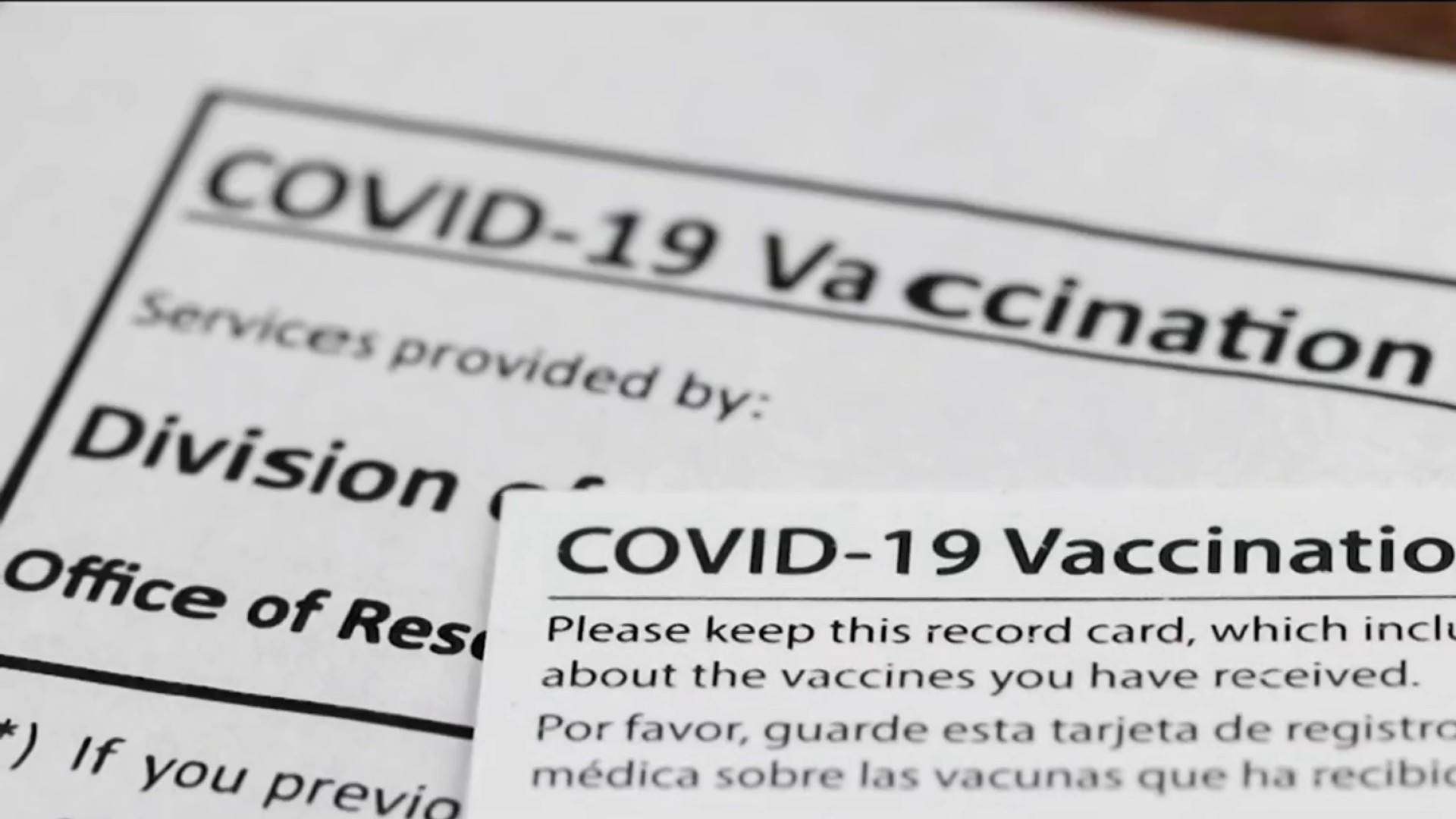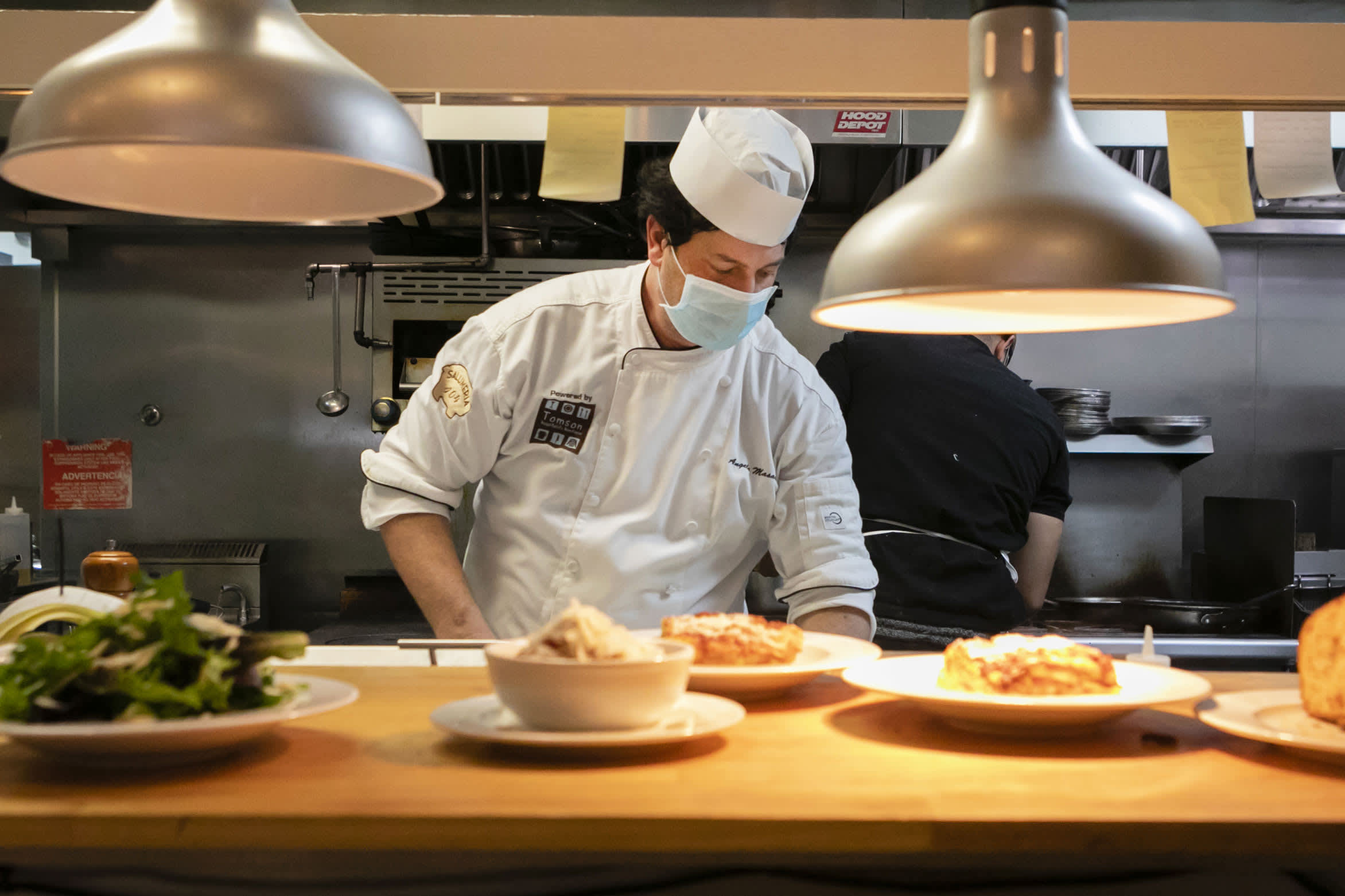Where will you need to show proof of vaccination in Chicago and Cook County now? What proof is accepted? Do you need a booster shot to be considered fully vaccinated?
As new vaccine requirements take effect for many in the Chicago area, here's a breakdown of everything you need to know about the new mitigations.
Where are vaccinations required?
Chicago
The proof of vaccine rules in Chicago will apply to everyone age 5 and older and includes restaurants, bars, gyms and other venues like sports and entertainment arenas. The rules don't apply to those inside venues for less than 10 minutes, like those picking up takeout.
According to the new guidelines, those 5 and older must show proof of full vaccination, but anyone ages 16 and older will also need to provide identification that matches their vaccination record. Employees at such venues will also need to either be vaccinated or wear a mask and show proof of weekly negative COVID-19 tests.
The city noted its indoor mask mandate also remains in effect.
Here's where you'll need to show proof of vaccination:
Indoor Dining
Feeling out of the loop? We'll catch you up on the Chicago news you need to know. Sign up for the weekly> Chicago Catch-Up newsletter.
Establishments where food or beverages are served, including, but not limited to, restaurants, bars, fast food establishments, coffee shops, tasting rooms, cafeterias, food courts, dining areas of grocery stores, breweries, wineries, distilleries, banquet halls, and hotel ballrooms
Indoor Fitness
Gyms and fitness venues, including, but not limited to, gyms, recreation facilities, fitness centers, yoga, Pilates, cycling, barre, and dance studios, hotel gyms, boxing and kickboxing gyms, fitness boot camps, and other facilities used for conducting indoor group fitness classes.
Indoor entertainment and recreation venues where food or beverages are served
Including, but not limited to, movie theaters, music and concert venues, live performance venues, adult entertainment venues, commercial event and party venues, sports arenas, performing arts theaters, bowling alleys, arcades, card rooms, family entertainment centers, play areas, pool and billiard halls, and other
recreational game centers.
This includes the United Center, the venue said.
The arena's new policy mirrors the city's. Fans age 5 and older must show proof of full vaccination. Fans age 16 and over will also need to provide identification that matches their vaccination record. And the mask mandate is also still in effect.
A negative COVID-19 test will no longer be sufficient to enter the arena.
In Chicago, some museums have also chosen to adopt the new guidelines.
City officials said technically, only areas where indoor dining is allowed at museums would be subject to the new requirement.
"If an establishment has both indoor and outdoor portions (for example, a museum with indoor and outdoor spaces for patrons), only the indoor portion is covered by the Chicago Vaccine Requirement," the city said in a statement. "In addition, it is only the dining area (food or drink) within a museum that needs to abide by the requirement."
But you'll want to check with each location individually, as some are requiring proof of vaccination to enter.
The Field Museum announced that it would require anyone age 5 or older to be vaccinated in order to enter.
Places not included in the requirement:
- houses of worship
- grocery stores (though indoor dining sections within grocery stores would be included)
- locations in O’Hare International Airport or Midway International Airport
- locations in a residential or office building the use of which is limited to residents, owners, or tenants of that building
- food service establishments providing only charitable food services, such as soup kitchens
- schools and day cares
Exemptions:
• Individuals entering an establishment for less than 10 minutes for ordering and
carrying out food; delivering goods; or using the bathroom;
• A nonresident performing artist who does not regularly perform or render services
in a covered location, or a nonresident individual accompanying such a performing
artist, while the performing artist or individual is in a covered location for the
purposes of such artist’s performance;
• A nonresident professional athlete or a nonresident individual accompanying such
professional athlete, who enters a covered location as part of their regular
employment for purposes of the professional athlete/sports team competition;
• Individuals who have previously received a medical or religious exemption (e.g.
from an employer), provided such patrons show the establishment proof of the
medical or religious exemption and a COVID-19 test administered by a medical
professional within the last 72 hours prior to entering.
• An individual 18 years of age or younger who enters a covered location to
participate in an activity organized by a school or after-school program offered by
any pre-kindergarten through grade twelve public or non-public school; and
• An individual who enters for the purposes of voting in a municipal, state, or federal
election; or, pursuant to law, assisting or accompanying a voter or observing such
election
Suburban Cook County
Suburban Cook County will also join Chicago in requiring proof of vaccination for such spaces.
The county's order - which includes all suburbs except for Evanston, Skokie, Oak Park and Stickney - calls for proof of vaccination for customers age 5 and older at indoor settings where food or drink are served, including bars, restaurants, entertainment venues, fitness facilities and more. Anyone 16 and older will also need to show identification matching their vaccine record.
Some of the suburbs not included in the order have chosen to enact a mandate alongside the county. At the same, some Cook County suburbs included in the mandate are choosing not to implement it.
In Evanston, Oak Park and Skokie, new rules will go into effect on Jan. 10.
Meanwhile in Orland Park and Elk Grove Village, leaders have said they do not plan on enforcing the requirement.
Here's where you'll need to show proof of vaccination:
Indoor Dining
Establishments where food or beverages are served and intended for on-site consumption. These include, but are not limited to, restaurants, bars, fast food establishments, coffee shops, tasting rooms, cafeterias, food courts, dining areas of grocery stores, breweries, wineries, distilleries, banquet halls, and hotel ballrooms
Indoor Fitness
Fitness centers include, but are not limited to, settings like health clubs, yoga studios, group fitness classes, recreation centers and dance studios.
Indoor entertainment and recreation venues where food or beverages are served
Entertainment venues include, but are not limited to, movie theaters, concert venues, live theater and music spaces, sports arenas, bowling alleys and arcades.
What about places that aren't included in the new guidelines?
Places not included in the requirement:
-Houses of worship
-K-12 schools, preschools and child care centers
-Indoor locations in a residential or office building that are limited to residents, owners or tenants of the building
-Charitable food service establishments, such as soup kitchens
Exemptions:
-Individuals entering an establishment for less than 10 minutes for ordering and carrying out food, making a delivery, or using restrooms
-Individuals who previously received a medical exemption, as long as proof of the medical exemption and proof of a negative COVID test within the last 24 hours are provided to the business upon entry.
-A non-resident performing artist or nonresident individual accompanying the artist who is not regularly performing in a business where the order applies.
-A nonresident professional athlete or nonresident person accompanying the athlete who enters a covered location as part of their regular employment for purposes of the professional athletic or sports competition.
-An individual 18 years of age or younger who enters a business to participate in a school activity or after-school program offered by a K-12 public or non-public school.
-Any person entering a business for the purposes of voting in an election, or assisting or accompanying a voter or observing an election.
-An individual 18 years of age or younger who enters a business subject to this Order to participate in an activity sponsored by a school, park district, child care or after-school program, or other organizations as defined in guidance by the Cook County Department of Public Health
-Youth or adults participating in special recreation programs
-Spectators of indoor sporting events provided that no food or drink is being served and that they remain masked at all time
What is considered 'fully vaccinated'?
- 2 weeks after their second dose in a 2-dose series, such as the Pfizer or Moderna vaccines, or
- 2 weeks after a single-dose vaccine, such as Johnson & Johnson’s Janssen vaccine
Chicago Department of Public Health Commissioner Dr. Allison Arwady said the city's definition of "fully vaccinated" matches that of the Centers for Disease Control and Prevention.
"By fully vaccinated, yes, I mean fully vaccinated as the CDC has defined it: Two weeks, right now, post your second dose of Pfizer or Moderna, or your one dose of J&J," Arwady said during a press conference last month.
Can you show a negative test?
Employees at such venues like bars, restaurants and gyms need to either be vaccinated or wear a mask and show proof of weekly negative COVID tests.
Patrons, however, will not have the option of providing a negative test result and must instead be fully vaccinated while indoors, according to Chicago Mayor Lori Lightfoot's latest announcement.
How can you show proof of vaccination?
- COVID vaccination card
- Photocopy of vaccination card
- Digital record of vaccination or a printed record from your vaccine provider
According to the new guidelines, those 5 and older must also show proof of full vaccination, but anyone ages 16 and older will need to provide identification that matches their vaccination record.
How long will the requirements remain in effect?
According to Chicago's health department, the order will remain in effect until the city "is through this omicron-driven surge and the risk of overwhelming hospital capacity has passed."



